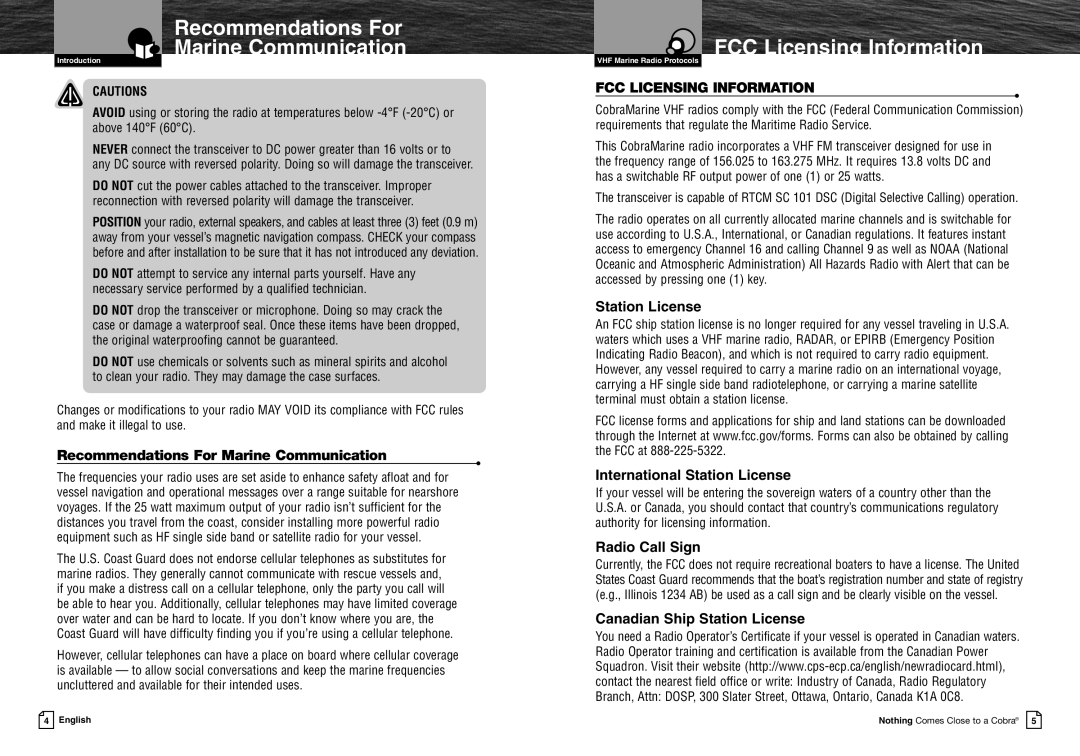
Introduction
CAUTIONS
Recommendations For Marine Communication
FCC Licensing Information
VHF Marine Radio Protocols
FCC LICENSING INFORMATION
•
AVOID using or storing the radio at temperatures below
NEVER connect the transceiver to DC power greater than 16 volts or to any DC source with reversed polarity. Doing so will damage the transceiver.
DO NOT cut the power cables attached to the transceiver. Improper reconnection with reversed polarity will damage the transceiver.
POSITION your radio, external speakers, and cablesat least three (3) feet (0.9 m) away from your vessel’s magnetic navigation compass. CHECK your compass before and after installation to be sure that it has not introduced any deviation.
DO NOT attempt to service any internal parts yourself. Have any necessary service performed by a qualified technician.
DO NOT drop the transceiver or microphone. Doing so may crack the case or damage a waterproof seal. Once these items have been dropped, the original waterproofing cannot be guaranteed.
DO NOT use chemicals or solvents such as mineral spirits and alcohol to clean your radio. They may damage the case surfaces.
Changes or modifications to your radio MAY VOID its compliance with FCC rules and make it illegal to use.
Recommendations For Marine Communication
•
The frequencies your radio uses are set aside to enhance safety afloat and for vessel navigation and operational messages over a range suitable for nearshore voyages. If the 25 watt maximum output of your radio isn’t sufficient for the distances you travel from the coast, consider installing more powerful radio equipment such as HF single side band or satellite radio for your vessel.
The U.S. Coast Guard does not endorse cellular telephones as substitutes for marine radios. They generally cannot communicate with rescue vessels and, if you make a distress call on a cellular telephone, only the party you call will be able to hear you. Additionally, cellular telephones may have limited coverage over water and can be hard to locate. If you don’t know where you are, the Coast Guard will have difficulty finding you if you’re using a cellular telephone.
However, cellular telephones can have a place on board where cellular coverage is available — to allow social conversations and keep the marine frequencies uncluttered and available for their intended uses.
CobraMarine VHF radios comply with the FCC (Federal Communication Commission) requirements that regulate the Maritime Radio Service.
This CobraMarine radio incorporates a VHF FM transceiver designed for use in the frequency range of 156.025 to 163.275 MHz. It requires 13.8 volts DC and has a switchable RF output power of one (1) or 25 watts.
The transceiver is capable of RTCM SC 101 DSC (Digital Selective Calling) operation.
The radio operates on all currently allocated marine channels and is switchable for use according to U.S.A., International, or Canadian regulations. It features instant access to emergency Channel 16 and calling Channel 9 as well as NOAA (National Oceanic and Atmospheric Administration) All Hazards Radio with Alert that can be accessed by pressing one (1) key.
Station License
An FCC ship station license is no longer required for any vessel traveling in U.S.A. waters which uses a VHF marine radio, RADAR, or EPIRB (Emergency Position Indicating Radio Beacon), and which is not required to carry radio equipment. However, any vessel required to carry a marine radio on an international voyage, carrying a HF single side band radiotelephone, or carrying a marine satellite terminal must obtain a station license.
FCC license forms and applications for ship and land stations can be downloaded through the Internet at www.fcc.gov/forms. Forms can also be obtained by calling the FCC at
International Station License
If your vessel will be entering the sovereign waters of a country other than the U.S.A. or Canada, you should contact that country’s communications regulatory authority for licensing information.
Radio Call Sign
Currently, the FCC does not require recreational boaters to have a license. The United States Coast Guard recommends that the boat’s registration number and state of registry (e.g., Illinois 1234 AB) be used as a call sign and be clearly visible on the vessel.
Canadian Ship Station License
You need a Radio Operator’s Certificate if your vessel is operated in Canadian waters. Radio Operator training and certification is available from the Canadian Power Squadron. Visit their website
|
|
|
|
4 English | Nothing Comes Close to a Cobra® 5 |
| |
